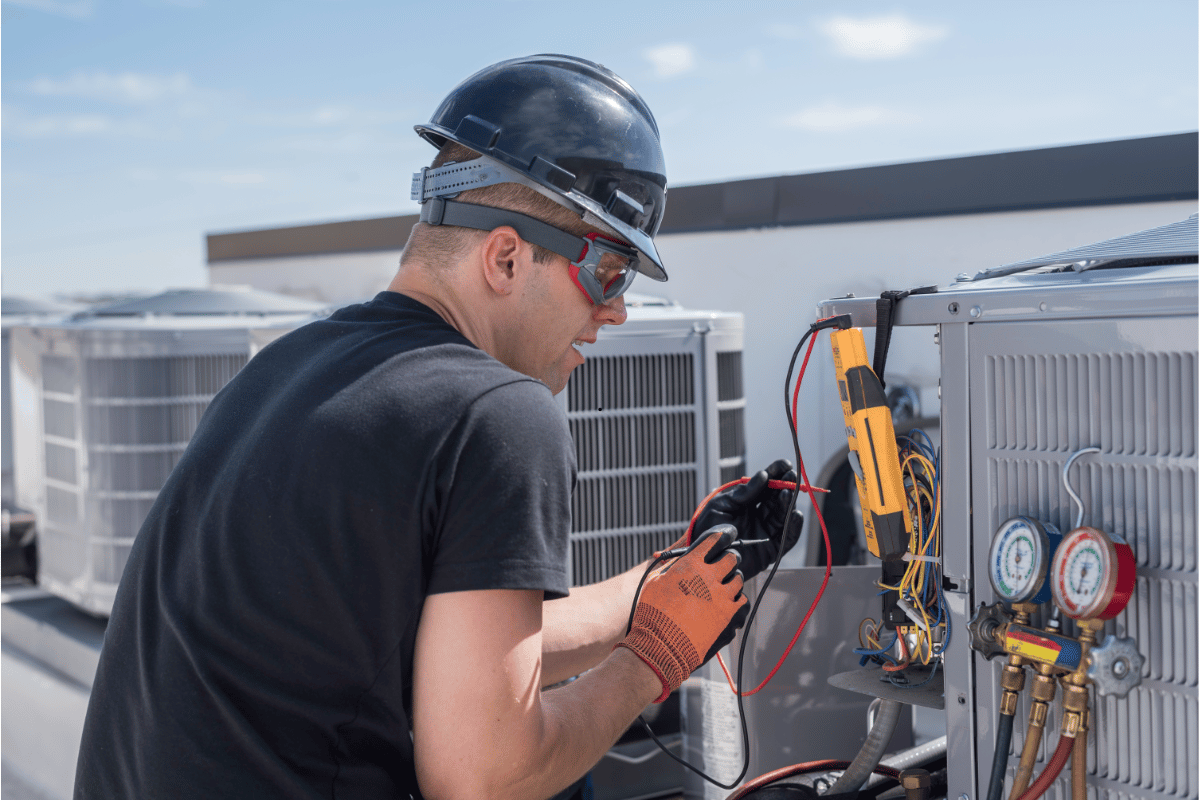Vocational Training: Your Ticket to a Cool Career in HVAC
Vocational training is your golden ticket to a career in heating, ventilation, and air conditioning (HVAC). If you want to be an HVAC whiz, you need the right skills and a grasp of the booming demand in the industry.
What You Need to Be an HVAC Pro
To rock it as an HVAC technician, you need a mix of technical know-how and personal skills. Sure, you can learn the tech stuff in vocational training programs, but don’t sleep on these personal skills:
- Talking the Talk: You’ll be chatting with clients and coworkers, so you need to get your point across without sounding like a robot.
- Listening Up: Pay attention to what customers say about their issues. It’s like being a detective but for air conditioners.
- Fix-It Mentality: Got a knack for solving puzzles? Great! You’ll need that to figure out what’s wrong with HVAC systems.
- Eagle Eye: Details matter. Miss one tiny thing, and you could mess up the whole system.
- Roll with It: HVAC tech is always changing. New gadgets, new methods—stay flexible and keep learning.
- Organized Chaos: Keep your tools and time in check. No one likes a messy worker.
- Go-Getter: Be the kind of person who takes charge and gets stuff done without someone breathing down your neck.
Pair these skills with the technical chops from vocational training, and you’re set for success.
Why HVAC is Hot Right Now
The HVAC industry is on fire (in a good way). According to the U.S. Bureau of Labor Statistics, HVAC techs are in high demand, with job growth outpacing many other fields (New England Institute of Technology). Why? People want energy-efficient systems, and HVAC tech is getting more complex. Plus, everyone needs someone to install, fix, and maintain these systems.
You can find HVAC gigs everywhere—homes, offices, schools, hospitals, you name it. Whether you’re working for a small business or a big company, you’ll be the hero who keeps the air fresh and the temperature just right (UTI).
And the pay? Not too shabby. The average HVAC tech in the U.S. makes about $48,730 a year, or $23.43 an hour (New England Institute of Technology). With the demand for HVAC services climbing, there’s plenty of room to grow.
So, if you’re looking to dive into a career with solid pay and endless opportunities, vocational training in HVAC might just be your best bet. Schools and training programs are ready to arm you with the skills you need to thrive in this ever-evolving field.
HVAC Training Programs
Ready to dive into a career in HVAC? Specialized training programs are your ticket to mastering the skills and knowledge you need. These programs come in different lengths and cover a wide range of topics to make sure you’re fully prepared.
How Long and What You’ll Learn
HVAC training programs can last anywhere from 6 months to 3 years. You get to pick what fits your schedule and goals. The length often depends on where you’re studying—vocational schools, community colleges, or through apprenticeships.
The curriculum is packed with everything you need to know about heating, ventilation, air conditioning, and refrigeration. Here’s a taste of what you’ll learn:
- Heating technology
- Refrigeration mechanics
- Air conditioning systems
- Air quality and filtration
- Climate control systems
- Electrical controls and wiring
But it’s not all technical. You’ll also pick up skills in communication, contract management, and safety protocols. This mix ensures you’re ready for anything the HVAC world throws at you.
Want more details on what you’ll study? Check out our article on vocational training for HVAC.
Picking Your HVAC Niche
The HVAC field is broad, and you can specialize in areas that match your interests and career goals. Here are some common specializations:
- Residential HVAC: Focus on heating, ventilation, and air conditioning systems in homes and apartments. Your job? Keep indoor air quality and comfort top-notch for families.
- Commercial HVAC: Handle bigger, more complex systems in places like office buildings, malls, and hospitals. These systems cover larger areas and have higher demands.
- Industrial HVAC: Work in factories, manufacturing plants, and warehouses. You’ll deal with specialized equipment and processes for large-scale heating, cooling, and ventilation.
- Refrigeration: Specialize in designing, installing, and maintaining refrigeration units used in various industries. You’ll need to know your way around refrigerants and the nitty-gritty of refrigeration tech.
Choosing a specialization lets you hone your skills and become an expert in a specific area. This can lead to more diverse and rewarding job opportunities.
So, if you’re thinking about HVAC training, knowing how long programs last, what you’ll learn, and the specializations available can help you make the best choice for your future.
Becoming an HVAC Technician
So, you’re thinking about becoming an HVAC technician? Great choice! Let’s break down what you need to get started, from licenses and certifications to what you’ll actually be doing on the job.
Getting Licensed and Certified
First things first, you need to get the right certifications. This varies depending on where you live, but one thing’s for sure—you’ll need to pass the EPA certification exam. This is a must-have for handling refrigerants and understanding environmental rules. On top of that, you’ll need the federal Section 608 Technician Certification, which is also about handling refrigerants and is managed by the US Environmental Protection Agency. Some states might have extra hoops for you to jump through before you can start working.
Do your homework on what your state requires. Getting through vocational training and nabbing those certifications will make you a hot commodity in the job market and show that you know your stuff.
What You’ll Be Doing
As an HVAC tech, your job is to keep heating, ventilation, and air conditioning systems running smoothly. Here’s a quick rundown of what you’ll be up to:
- Installing Systems: Whether it’s a cozy home or a bustling factory, you’ll be setting up HVAC systems.
- Routine Check-ups: Regular inspections and maintenance to keep things running efficiently.
- Troubleshooting: Figuring out what’s wrong when the system isn’t working right.
- Fixing Stuff: Repairing or swapping out broken parts.
- Fine-Tuning: Adjusting controls to get the perfect temperature and humidity.
- Energy Advice: Suggesting upgrades to make systems more energy-efficient.
You could find yourself working in homes, office buildings, hospitals, schools, or even factories. You might work for an HVAC service company, a contractor, or even strike out on your own. The need for HVAC techs isn’t going away anytime soon—everyone needs heating and cooling!
Getting Started
To kick off your career, you’ll need the right training and certifications. Vocational programs are a great way to get the hands-on experience and technical know-how you need. For more info on these programs, check out our article on vocational training programs.
So, if you’re ready to dive into a career that’s always in demand and offers plenty of variety, HVAC might just be the perfect fit. Get the right training, grab those certifications, and you’ll be well on your way to a rewarding job in the HVAC industry.
Salary and Opportunities
Thinking about diving into the HVAC field? Let’s break down the money and job prospects you can expect with some solid vocational training.
Average Income for HVAC Technicians
In the U.S., HVAC techs, mechanics, and installers pull in an average of $23.43 per hour, which adds up to about $48,730 a year. But, depending on your experience, where you work, and who you work for, that number can change. Some reports even peg the average salary at $51,000 (Best Trade Schools). Not too shabby, right? Plus, the perks and benefits make this a pretty sweet gig.
Career Paths and Job Outlook
HVAC techs are the unsung heroes keeping our homes and businesses comfy. They handle heating, ventilation, and air conditioning systems, which are getting more complex and energy-efficient every year. That means there’s a growing need for skilled folks in this line of work.
You can get the training you need in as little as six months to two years at a vocational school (Best Trade Schools). Once you’ve got the skills and certifications, a bunch of career paths open up:
- HVAC Technician: The go-to role for HVAC grads. You’ll be installing, maintaining, and fixing HVAC systems to keep them running smoothly and efficiently.
- HVAC Installer: These pros focus on setting up HVAC systems in new buildings or retrofitting old ones. They work with contractors and follow blueprints to get everything just right.
- HVAC Service Technician: If you like solving problems, this might be your jam. Service techs diagnose issues, perform regular maintenance, and troubleshoot to keep systems in top shape.
- HVAC Sales Representative: Got a knack for sales? Use your HVAC know-how to help customers find the right products and services for their needs.
- HVAC Project Manager: Oversee HVAC projects from start to finish. You’ll coordinate with techs, clients, and other stakeholders to make sure everything goes off without a hitch.
The future looks bright for HVAC techs, with job growth expected to hit 5% over the next decade and 394,100 jobs available in 2021 (Penn Foster). As more people and businesses look to upgrade their HVAC systems, skilled techs will be in high demand. This means plenty of chances to climb the career ladder, specialize, or even start your own business.
So, if you’re thinking about HVAC, know that it offers a solid mix of good pay, job security, and room for growth. It’s a great choice for anyone interested in technical and trade work.


